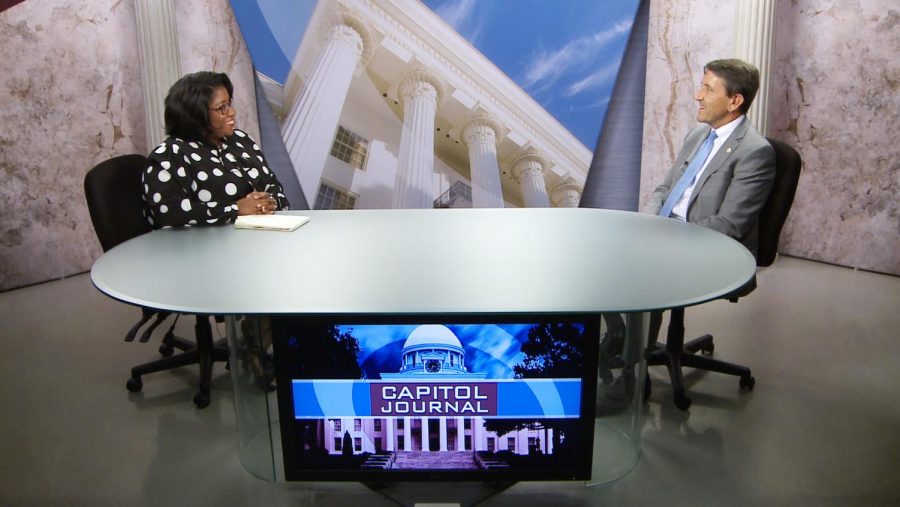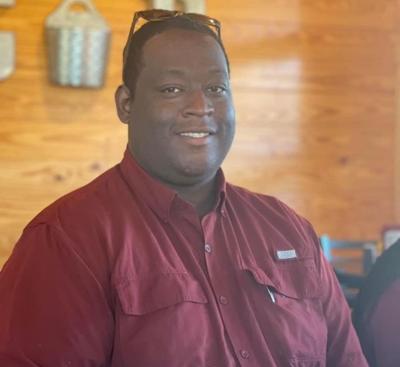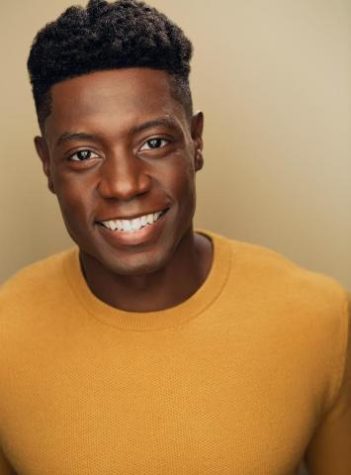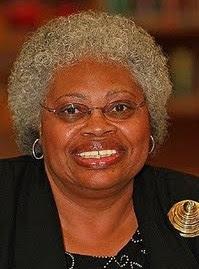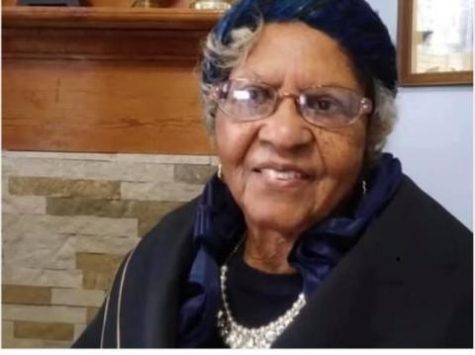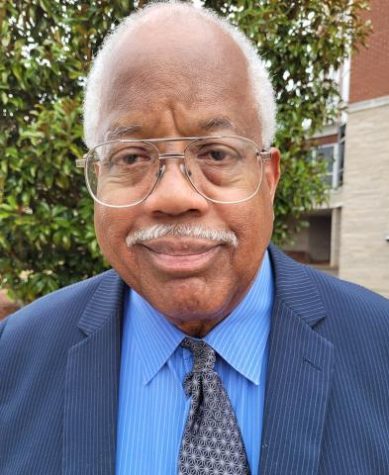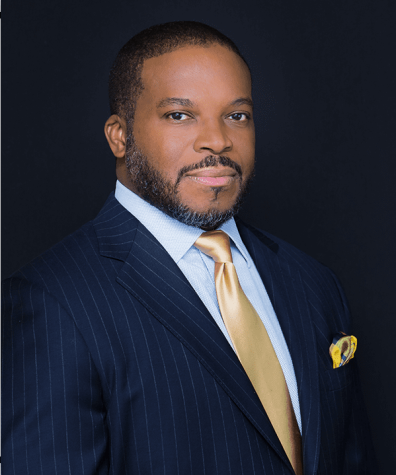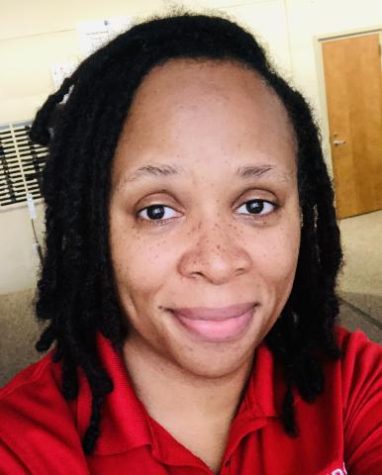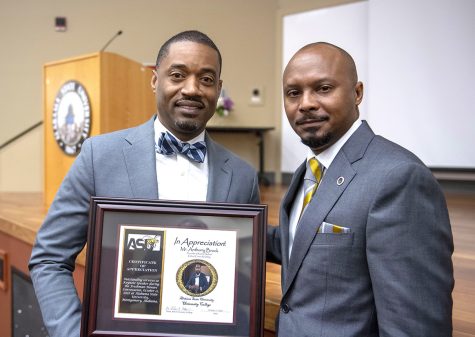Goldsmith, a psychology major but a broadcast journalism master
Karen Goldsmith appears regularly on the news show “Capitol Journal” that airs on the Public Broadcast network. She analyzes the news of the week and adds commentary for viewer understanding.
October 24, 2020
Many people are familiar with the phrase, “Hard work beats talent when talent doesn’t work hard,” but what happens when hard work meets talent?
A great example is Karen Brown Goldsmith, a 1994 alumna of Alabama State University.
Goldsmith is a local television writer, director, editor and producer who is making remarkable career moves thanks to her natural given talents in journalism combined with a strong work ethic, high standards and tenacious ambition.
What is so interesting about Goldsmith is as a college student, she did not plan on making a career out of a hobby, but as time progressed and opportunities presented themselves, she knew her hobby was actually her calling.
She was born and raised in Montgomery, Alabama. Since she grew up in the area, Alabama State University played an integral role in her upbringing. As a child, she attended Zelia Stephens Early Childhood Center, along with a number of her family members.
Not only did her mother and grandmother attend the university, but that is also where her parents met. She spoke of all the roles that Alabama State University served in her childhood.
“Alabama State University is just so ingrained in my life and who I am …” Goldsmith said.
Not only was it her dream school, but it was the only school on her list when it came time for her to decide on an institution of higher learning.
She always knew that she was supposed to be a Hornet, but she did not know that the Hornet’s nest would lead her to the type of professional success that she is grateful for today.
As a child, Goldsmith held an unwavering interest in public speaking and the press. During her third-grade year at Zelia Stephens Early Childhood Center, she was given the opportunity to recite the poem “I Live for Those Who Love Me” at the 1979 Alabama State Founders’ Day Convocation. This sparked her love for speaking in front of others.
Her launch into journalism began early in high scool.
“In ninth grade, I applied to be on the yearbook staff and that started my official launch into journalism … and the rest is history,” she states.
A year later, while in high school, she capitalized on becoming a member of the broadcast journalism magnet program at George Washington Carver Senior High School.
Due to her involvement with the broadcast journalism magnet program, she had the chance to intern at various media stations such as WSFA 12 News and many other radio stations.
In addition to internships, the high school magnet program also allowed her to produce a radio show that was aired by WVAS-90.7 the university’s own jazz and talk radio. She took part in all of these extracurricular activities, completely oblivious that she would eventually return to that same newsroom, but, this time, as a respected employee rather than a time-killing teen.
As an undergraduate student, Goldsmith majored in psychology partnered with a minor in criminal justice. Throughout her years as a Hornet, she took the necessary courses for her degree, but also continued her journalistic hobby by working as a writer for The Hornet Tribune, the university’s student news source. Goldsmith blushed through the phone as she reminisced.
“That was so much fun! It was such a fun, a true confidence-building experience.”
It was the time with this extracurricular experience that gave her the confidence as a writer and reporter that was needed to jump start her career. She specifically credits Kenneth Dean, J.D., the general manager of The Hornet Tribune, for creating an environment that allowed her to explore her creativity and also for exposing her to new newsworthy experiences.
Goldsmith remembers being excited to go to the newsroom and get to work with her classmate. She now carries that same enthusiasm and excitement to her job as a Capitol News Reporter for Alabama Public Television (APT).
“I go to work every day, laugh and have a good time, but I get the work done,” she said. “And I have to credit Mr. Dean and working on The Hornet Tribune for showing us that we can combine the two.”
Goldsmith graduated with her degree in psychology in 1994 and worked as a graduate student in the university’s Office of Communications and Public Affairs. While working in that office, she heard of a job opening in a field that she was informally familiar with, at the WVAS radio show where she had interned while in high school. Goldsmith worked in the morning at the radio station as a morning show producer while also working for the Office of Communications and Public Affairs handling alumni newsletters and such in the afternoon.
After a few years, she took a break from journalism to do some public policy and advocacy work, but returned to WVAS radio in 2009.
Soon after several years at WVAS, Goldsmith returned to broadcast journalism, APT, who had closed their news series due to financial issues. However, about a year later, they relaunched and were in need of writers. Goldsmith, a psychology major with no formal education in journalism or communications, jumped at the call.
“With all the confidence that I got from ASU, I volunteered!” she said.
She continued.
“I had no experience in television outside of my schoolwork and the few months that I had volunteering, but I took the time to learn everything I could,” she says. Eventually, her volunteer work for APT turned into a paid position, leading to her current success as a Capitol News reporter.
Goldsmith currently serves as only black female capitol reporter for the entire state of Alabama and she wholeheartedly credits her triumph to ASU. Though she is qualified to cover many topics, she chose to specialize in state politics and state budgets because of the lessons that she learned as a Hornet.
As an undergraduate, she remembers taking math and psychology classes with professors that took the time to break concepts down and teach in ways that she would understand. These classes might not have been specifically for journalism, but they assisted in her comprehension of the information that she is reporting.
“I felt confident and comfortable in an environment that catered to my learning style, and I got it!” she said.
When asked if she would go back to change her course of study if she were given the opportunity, she hesitated, and then responded, “To have been doing this since 1997, off and on, and only have had one story that had an issue, I’m pretty proud of that and I don’t think not having a degree in journalism hurts me.”
Goldsmith firmly believes that her psychology degree gives her an upper hand when dealing with the politicians that she interacts with on a daily basis.
It was also ASU that taught her the life skill of professionalism, which she believes has carried her far in her journey. She specifically remembered former dean of University College, Alma S. Freeman, Ed.D.
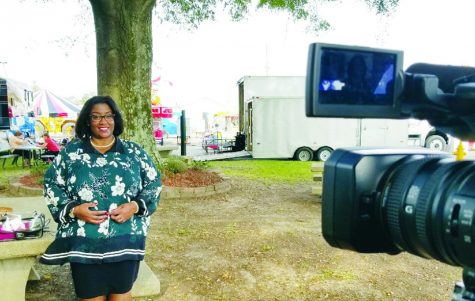
“She had a reputation of being stern, tough, but fair,” Goldsmith said. “She expected you to be responsible. She held you to the standard of what a young adult should be held to. She gave us pride that as young African Americans, you might not get outside of that wonderful comfort bubble of being at a historically black college or university.”
It is this trait that gives her an advantage as a black woman in her field of work and allows her exclusive interviews and opportunities to create groundbreaking stories, such as Alabama’s Bicentennial Special, where she recounted the state from the perspective of black history.
“I felt it was very important,” she said. “The role that Montgomery played in the domestic slave trade and how that connects to prison issues that we are struggling with today… It was unique. It was something that nobody else had done and I was proud to do that story.”
Along with all of her success in broadcast journalism, Goldsmith shares her time with her husband Kenneth, and their blended family. At home, she enjoys spending time with her stepchildren, grandchildren and in-laws, as long as they don’t interfere with her Sunday dates with ESPN and the NFL.
To current students, she emphasizes the importance of integrity in one’s journey.
“My mother taught me that your word is your bond, she also taught me you aren’t better than anybody,” she said, “but you are better than some situations.”
Staying true to herself and trusting her calling led her to be the well-respected writer, editor and producer that she is today.
When thinking of her journey, Goldsmith reflects, “It’s all a full circle. Every step you make is a connection to something else.” She stands by the belief that, as African Americans in this social climate, you must work twice as hard as any other colleague to be respected equally. To do this, “one must be confident in their work and what they bring to the table.”
She chuckles as she continues to advise students.
“Don’t let somebody like me take your job!” referring to her considerable achievements in a field that began as no more than a hobby to her.
As mentioned earlier, many are familiar with the phrase “hard work beats talent when talent doesn’t work hard,” but Goldsmith demonstrates that when hard work meets talent, the possibilities are endless.


